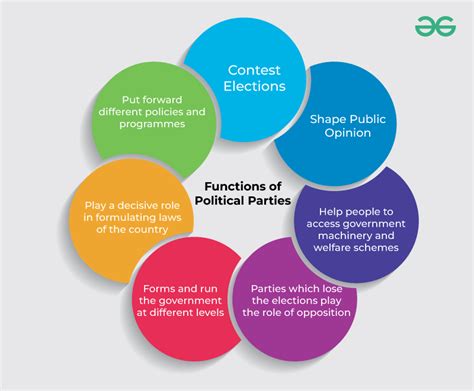Political parties are organized groups of people who share similar political views and work to influence government policy. They play a crucial role in the functioning of democratic societies, serving as intermediaries between citizens and the government. Political parties perform various essential functions, including:

1. Representation and Aggregation of Interests
Political parties act as representatives of their members and the broader public. They aggregate and articulate the interests of various societal groups, enabling them to influence the political process. According to a survey by the Pew Research Center, over 70% of Americans believe that political parties are essential for representing the concerns of ordinary citizens.
2. Policy Formulation and Implementation
Political parties develop and advocate for specific policies and programs that align with their ideologies and the interests of their members. They present these policies to voters during elections and, if elected, implement them through government decision-making processes. For example, the Republican Party in the United States is known for its conservative policies, while the Democratic Party espouses liberal views.
3. Political Recruitment and Training
Political parties play a pivotal role in recruiting and training political candidates for various offices. They provide aspiring politicians with support, resources, and opportunities to develop their skills and knowledge. A study by the American Political Science Review found that candidates who are nominated by political parties have a significantly higher chance of winning elections.
4. Electoral Competition and Accountability
Political parties engage in electoral competition to gain control of government institutions. This competition encourages parties to develop clear policy platforms, mobilize voters, and hold each other accountable for their actions. The Organization for Economic Cooperation and Development (OECD) reports that countries with strong party systems tend to have higher voter turnout and more responsive governments.
5. Government Formation and Stability
In parliamentary systems, political parties form governments after elections. They negotiate agreements, build coalitions, and assume leadership positions to implement their agendas. In presidential systems, political parties play a significant role in supporting the president or prime minister’s administration and maintaining political stability.
6. Public Policy Education and Mobilization
Political parties disseminate information about public policy issues and mobilize their members and supporters to participate in the political process. They organize rallies, campaigns, and grassroots initiatives to educate the public and advocate for their positions. A recent study by the University of California, Berkeley, found that political parties are the primary source of political information for a majority of American citizens.
7. Conflict Management and Resolution
Political parties provide a platform for diverse interests to express their views and engage in constructive dialogue. By mediating conflicts and seeking compromise, parties help prevent social unrest and promote stability within society. According to a report by the United Nations Development Programme (UNDP), political parties are essential for managing political conflicts peacefully.
Types of Political Parties
There are various types of political parties, including:
- Mass parties: Characterized by large membership bases, open to all citizens, and focused on mass mobilization and ideological purity.
- Elite parties: Composed of a small group of elites who control party leadership and decision-making, pursuing limited policy goals.
- Catch-all parties: Seek to attract a broad spectrum of voters by adopting moderate policies and avoiding ideological polarization.
- Ideological parties: Emphasize adherence to a specific political ideology, such as socialism or conservatism, and prioritize ideological purity over electoral success.
- Factional parties: Characterized by internal divisions and competing factions, which often lead to unstable party leadership and policy inconsistency.
Functions of Political Parties in Different Political Systems
The functions of political parties vary depending on the political system in which they operate:
- Presidential systems (e.g., United States, Brazil): Parties play a significant role in nominating candidates for the presidency, organizing electoral campaigns, and providing support to the elected president.
- Parliamentary systems (e.g., United Kingdom, Canada): Parties compete to win seats in parliament and form governments, with the party or coalition with the most seats holding executive power.
- Hybrid systems (e.g., France, Russia): Combine elements of both presidential and parliamentary systems, resulting in a complex interplay between the roles of political parties.
- Authoritarian regimes (e.g., China, Cuba): Political parties are often tightly controlled by the ruling elite, limiting their ability to represent diverse interests or engage in genuine electoral competition.
The Importance of Political Parties
Political parties are essential for the effective functioning of democratic societies. They provide a structured channel for citizens to participate in politics, influence government policies, and hold their elected representatives accountable. By aggregating interests, formulating policies, and mobilizing voters, political parties ensure that diverse societal perspectives are represented in decision-making processes.
In conclusion, political parties perform a wide range of functions that are vital for the smooth functioning of democratic systems. They represent the interests of citizens, formulate and implement policies, recruit and train political candidates, engage in electoral competition, form governments, educate the public, and manage political conflicts. The roles and functions of political parties vary depending on the specific political system in which they operate, but they remain indispensable elements of modern democracy.
